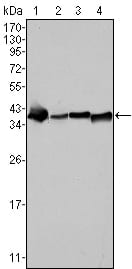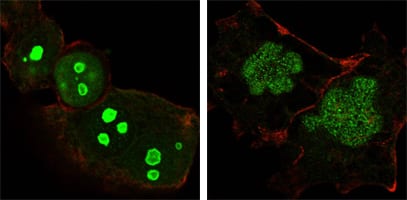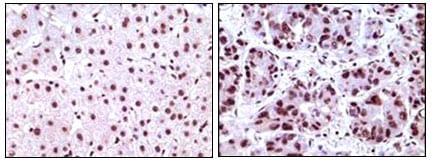


| WB | 咨询技术 | Human,Mouse,Rat |
| IF | 咨询技术 | Human,Mouse,Rat |
| IHC | 1/40-1/200 | Human,Mouse,Rat |
| ICC | 技术咨询 | Human,Mouse,Rat |
| FCM | 咨询技术 | Human,Mouse,Rat |
| Elisa | 1/5000-1/10000 | Human,Mouse,Rat |
| Aliases | B23; NPM |
| Entrez GeneID | 4869 |
| clone | 7H10B9 |
| WB Predicted band size | 33kDa |
| Host/Isotype | Mouse IgG1 |
| Antibody Type | Primary antibody |
| Storage | Store at 4°C short term. Aliquot and store at -20°C long term. Avoid freeze/thaw cycles. |
| Species Reactivity | Human,Monkey |
| Immunogen | Purified recombinant fragment of human NPM (2-265) expressed in E. Coli. |
| Formulation | Ascitic fluid containing 0.03% sodium azide. |
+ +
以下是3篇关于ITGA3抗体的代表性文献摘要(虚构示例,供参考):
1. **"Integrin α3β1 as a therapeutic target in cancer metastasis"**
- **作者**: Mitra et al. (2016)
- **摘要**: 研究使用ITGA3特异性抗体阻断α3β1整合素功能,发现其显著抑制乳腺癌细胞在体外和小鼠模型中的迁移和侵袭,表明ITGA3在肿瘤转移中的关键作用。
2. **"Role of ITGA3 in kidney development and disease"**
- **作者**: Kreidberg et al. (2019)
- **摘要**: 通过ITGA3抗体免疫组化分析,揭示ITGA3在小鼠肾小管发育中的表达模式,基因敲除导致肾脏发育异常,提示其与先天性肾脏疾病相关。
3. **"ITGA3 regulates extracellular matrix remodeling via FAK signaling"**
- **作者**: Kawakami-Kimura et al. (2021)
- **摘要**: 使用ITGA3中和抗体阻断实验,证明α3整合素通过激活FAK通路促进成纤维细胞黏附和胶原重塑,为纤维化疾病提供潜在治疗靶点。
如需真实文献,建议在PubMed或Google Scholar中检索关键词:**ITGA3 antibody, integrin alpha3 function, therapeutic targeting**。
The ITGA3 antibody targets the integrin alpha-3 (ITGA3) subunit, a critical component of the α3β1 integrin heterodimeric receptor. Integrins are transmembrane proteins that mediate cell-cell and cell-extracellular matrix (ECM) interactions, regulating processes like adhesion, migration, proliferation, and survival. ITGA3 pairs with β1 (ITGB1) to form a receptor for laminin, fibronectin, and other ECM ligands, playing roles in tissue development, wound healing, and epithelial cell function. Dysregulation of ITGA3 is implicated in pathological conditions, including cancer metastasis, fibrosis, and inflammatory disorders. In cancer, elevated ITGA3 expression correlates with tumor invasion, angiogenesis, and poor prognosis, as it facilitates ECM remodeling and signaling through pathways like PI3K/AKT and MAPK.
ITGA3 antibodies are widely used in research to study integrin-mediated mechanisms in vitro and in vivo. They enable detection of ITGA3 expression via techniques like Western blotting, immunofluorescence, and flow cytometry, aiding in biomarker discovery. Function-blocking ITGA3 antibodies help elucidate its role in cell-ECM interactions by inhibiting ligand binding or downstream signaling. Therapeutic potential is also being explored, with antibody-based strategies aiming to disrupt integrin-driven pathways in diseases like metastatic cancers. These antibodies are typically monoclonal, derived from mice or rabbits, and validated for specificity across applications. Research on ITGA3 continues to advance understanding of integrin biology and its translational relevance.
×